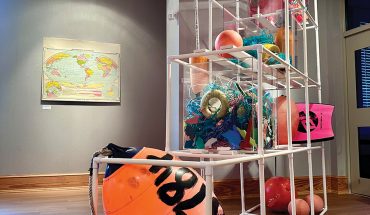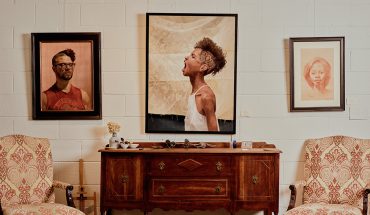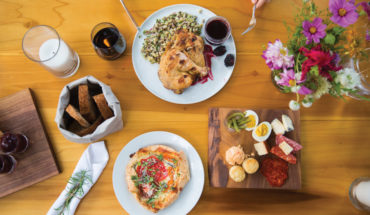Two creative Raleigh Moms collaborate to launch an easy, enriching summer solution for children.
as told to Addie Ladner
Art educator Emily Kotecki and artist Jean Gray Mohs want parents to thrive this summer, not just survive. At the start of the COVID-19 pandemic, Kotecki and Mohs combined their skill sets and passions and launched Tin Can Kids, a virtual schoolhouse with 20-minute daily field trips led by parents, kids and educators all over the country. Thanks to them, dozens of kids learned and crafted with friends and experts: KidLab Raleigh, The Smithsonian, Quail Ridge Books, among many others. Now they’ve traded the virtual field trip for a Summer Toolkit to keep kids inspired and engaged through the summer. We caught up with the two to talk about their easy, family-led summer experience kits.
Hi guys! How’s summer going? What have you all been up to?
Kotecki: We’ve been opting outside a lot. We live near Umstead State Park so quite often go there or to the Carl Schenck Forest. Being outside has been a way to connect in a relaxed way.
I also love cooking with my kids and they’ve gotten more and more independent in their cooking since we’ve been home so that’s been fun!
Mohs: We’ve been cooking the slow foods, enjoying our meals, biking on the greenway, boardwalks in Raleigh. There’s a portion of it near downtown along Crabtree Creek (N Raleigh Boulevard) that we like. It’s a great place to look for Great Blue Herons, mallards, plants, etc. It’s been about slowing down and not having to hustle-observing nature, listening to birds, tuning into small things. I’m also super project-oriented, so we’re painting rooms, building play kitchens. The kids are getting their hands on materials and we’ve been letting them get very messy this summer.
Let’s talk Tin Can Kids. How did this come about?
Mohs: It was important for us when schools closed and we had to shift gears that we could make this experience fun while allowing for engagement and freedom but structure. We wanted our kids to be able to see their friends and continue to learn too.
And now you’ve launched a Tin Can Kids Toolkit. Tell us about it.
Kotecki: In the same way, when Tin Can Kids started we wanted to meet their needs this summer, maybe there’s no camp or nanny, or parents are not comfortable leaving the house yet, we wanted to offer something more robust. It’s a camp of sorts. We’ve got a different theme each week (ocean, space, self-care, the body, bugs, plants, etc.), with downloadable schedules, print-outs, suggested activities at home and more. We’ve also kept our original Tin Can community and platform with blog posts and opportunities for campers to see one another like on Lunch Bunch Fridays.
Mohs: One of my favorite things about the Tin Can Kids community was the interactiveness and rich connection. We fostered that on our website-other kids are doing these curated activities with you. There’s a place for you to post videos and pictures and we’re hoping to be able to deepen those connections with the summer camp. When you register, you’re given access to the private portion of our platform where you can interact and post photos and notes about your week. It’s up to you in what you’re looking for in a camp!
What’s the setup like?
Mohs: After you purchase your membership on our website you’ll have full access to our weekly schedule, including summer sheets, blog posts, demonstrations, recipes and lots more. The schedule includes three to four daily activities around a theme with materials you likely have at home. The camp is suited for pre-K to third grade but can be leveled up and down.
What would you say to parents (like myself) who found virtual learning and activities to be difficult with having other young kids and job requirements to consider?
Kotecki: We’ve set this up to be incredibly easy and at your own pace. Other than Lunch Bunch Fridays, there’s not a ton of set expectations and times you have to tune in. It’s a camp in a kit, so depending on your bandwidth and your child’s interest, you can do as much of it or as little as you like. Of course, there are lots of fun ideas so we hope people can utilize it! It’s very much go-at-your-own-pace, simple things you can do at home with what’s around and we planned it in that way with the understanding that many parents might be tapped out of the virtual stuff after last year’s schooling.
What are both of your backgrounds and how have you applied that to this project?
Kotecki: My background is in museum education with experience in distant learning. It’s largely a place that’s an informal learning environment, and I’ve thought a lot about the meaning of that now, creating virtual field trips and maximizing the learning space. Summer is also an informal learning opportunity. Similarly to museums, it’s a choose-your-own experience, you can walk around as you like and go at your own pace. We’ve created a similar informal but interactive learning experience with our Tin Can Kids community.
Mohs: I’ve straddled being an artist and an art educator for a long time. In every facet of my career, there has been art. I’m a problem solver and a creative thinker and try to instill that in my kids to be able to think for themselves and to articulate what they’re feeling. I’ve applied all of this to Tin Can Kids.
What tips would you have for parents of young kids when it comes to crafting and camping together this summer?
Kotecki: I’d say to let them lead the conversation and activities and they’ll be more invested in it. Take an idea they have and go with it. It should be flexible and observe what your kids are engaged in. There’s beauty in having time with your kids right now and allowing them to be a part of these processes to cherish and enjoy.
Mohs: As an art teacher, I’d say to let go of perfection and embrace the mistakes and the process. That’s where the lessons are like cleaning up after a spill. In Montessori schooling, kids use glass because they learn if they drop it, it spills and breaks. Allow yourself freedom to make mistakes.
To learn more about Tin Can Kids and sign up for their Toolkit, click here.
P.S. We shared the story of Jean Gray Mohs in our April issue which you can read here.






